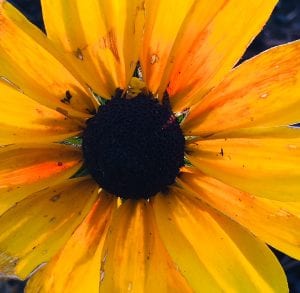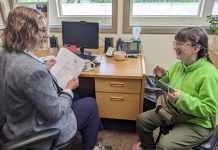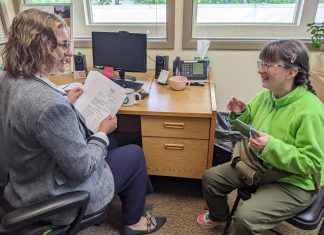The flowers are blooming, the bees are buzzing and I’m sneezing my head off. This annual routine feels almost ritualistic in its predictability. I’m a life-long allergy sufferer.
I had my first scratch test when my exasperated mother, tired of my continual sneezing, eye rubbing and itching, took me to an allergist. After covering my back in upwards of 30 miniscule scratches dabbed with various outdoor allergens, the test had to be called off. I was allergic to every single thing, except one: cherry trees. This single spot of calm, pale skin stood out like an island amid a fiery ocean of inflamed reaction. They had to medicate me to calm down my enraged system.

Years of allergy shots accompanied by daily anti-histamines followed. This kept things more or less under control and the shots really did work. To this day, I can smell the sweet scent of pine without breaking into sneezing fits like I once did. Unfortunately, there aren’t enough shots in the world to cover all of my seasonal allergies. Basically, if it grows – I’ll sneeze at it.
So, what’s a sun- and spring-loving, outdoorsy kind of girl to do when Mother Nature really lets loose? Oh, there’s an app for that.
App
The free WebMD Allergy app provides personalized daily weather and allergy forecasts, along with customized tips on how to best handle your allergies. It’s not always possible to avoid seasonal allergens, but knowing when pollen is at its peak may inspire you to plan your day differently.
Keep Clean

A big step toward avoiding an allergic reaction is avoiding the allergen itself. If you’re out gardening and doing yard work, consider wearing a mask, particularly one with HEPA (high-efficiency particulate air) filters to keep out the pollen and dust. Change filters often to keep everything clean and clear. A face mask may not be the most attractive look but neither is red eyes, puffiness and continually streaming snot. Best to choose your battles. Also, sunglasses can help keep pollen out of your eyes.
Whether you wear a mask or not, be sure to shower at the end of the day. This prevents pollen or other contaminants from being transferred to your pillow and stirring up trouble all night long. Likewise, wash your face as needed throughout the day. Even a simple warm water rinse can erase the irritants and leave you feeling refreshed.
Just like your hair and skin should be kept clean from allergens, so should your nasal passages. It’s surprising how easily irritants can hide up there. Neti pots are a great solution to keep the passageways clean. I prefer NeilMed Sinus Rinse, which is slightly more user-friendly. You just mix up the solution, rinse both sides of your nasal passages and you’re good to go.
Set Your Home for Success

Be sure your home is as close to an allergen-free sanctuary as possible. Keep problematic plants out and use HEPA filters in your air conditioner. Some people also find using a humidifier helps alleviate their allergy symptoms.
Keep an eye on your furry friends, as well. Cats and dogs are excellent transport mechanisms for hidden pollen. Your animal companion may not like routine bathing, but your inflamed sinuses will thank you.
Diet

Many outdoor allergy sufferers also have unknown food allergies. These are often mild and don’t illicit an obvious reaction, but contribute to overall allergy inflammation. It’s a good idea to pay attention to which foods cause you to feel extra stuffy or otherwise out of sorts. Food elimination diets can help you solve the mystery and a qualified allergist can test to determine which foods may be problematic. If you eliminate dietary allergens, your other allergies may ease.
There is also some evidence that eating local raw honey may help build tolerance to local pollens. While the jury is still out as to how definite this claim is, who wouldn’t love eating a tablespoon of fresh, local honey every day?
Similarly, there are a variety of herbs that have been used to alleviate allergies for centuries. If you are interested in learning more, talk to a certified naturopath.
Medications

There are a variety of antihistamines, nasal sprays and other treatment options available to tame your allergies. But not all solutions are created equal. I’ve had more success with some than with others – one steroid-based nasal spray gave me a facial rash that was definitely not worth it. Other medical treatments have greatly helped alleviate my symptoms. The point? If you’re fed up with your allergies, get the help of a qualified professional. They can discuss your options, the pros and cons of each, and help you set up an allergy attack plan.
William H. Anderson, MD and Sally Newbrough, MD at PeaceHealth are qualified to assist you in taming your allergy demons. It really helps to have a trained professional in your corner. When you’ve had enough, extra support is nothing to sneeze at.
PeaceHealth Medical Group Allergy & Immunology
Cordata Main
4545 Cordata Parkway, Suite 1C
Bellingham
360-738-2200







































